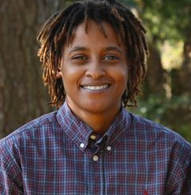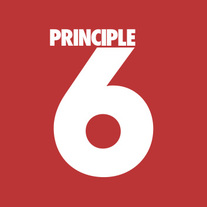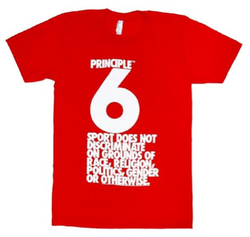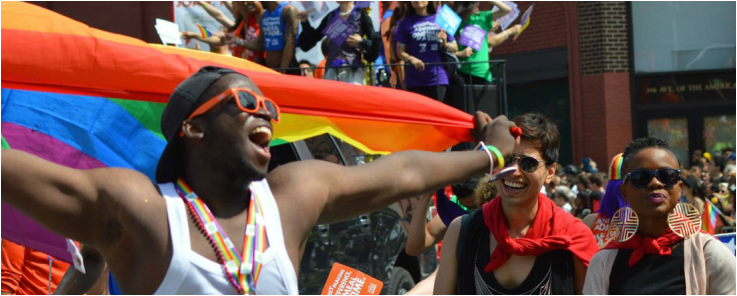 Jameka Evans was a security guard at Georgia Regional Hospital in Savannah, Georgia. From the beginning of her employment in 2012, Evans was treated badly. She was harassed verbally and physically; she was criticized for wearing a "male" uniform and having a short haircut, and for not carrying herself in a "traditional woman[ly] manner." In short, she was being harassed for both her gender presentation and her sexual orientation. Evans left her job about a year later, sick of the constant harrassment, and filed a complaint under a federal law known as "Title VII." Title VII prevents discrimination on the basis of sex, including sex stereotyping. The case went to a federal district court, where she lost because the court said that Title VII was intended to protect "sex," not "homosexuality." Evans then appealed to the next court up (the 11th Circuit, since she lives in Georgia), saying that Title VII prevented discrimination against her on the basis of sexual orientation and gender presentation. That court, too, ruled against her (and as a Slate article pointed out, the ruling was weird in a variety of ways). The court separated the gender nonconformity part from the sexual orientation part. They vacated (basically overturned, but without creating precedent) that part of the district court's order, saying that she could go back and try with that part of the case again. Evans and her lawyers then asked for something called an "en banc" hearing, which means that instead of the usual three-judge panel, all the judges on the 11th Circuit would have heard the case. This was denied, meaning that the ruling against Evans stands--at least, until the U.S. Supreme Court says otherwise. So Evans, represented by Lambda Legal, decided to petition the Supreme Court to hear the sexual orientation part of the case. The petition (which you can download from this site if you're interested) is terrific, clearly explaining why discrimination on the basis of sexual orientation is a form of gender discrimination. It states, "It cannot be that Title VII allows an employer to fire Sharon for exercising her constitutional right to marry her girlfriend while retaining her co-worker Samuel after he marries his." Will the Supreme Court take the case? Who knows. But I suspect it will, since nearly all the circuits have weighed in, there's a circuit split (thanks to the 11th Circuit), and it's an important issue. To go back to the gender nonconformity piece for a minute: it's kind of interesting: Title VII definitely applies to "sex stereotyping" (as the Supreme Court decided in a 1989 case called Price Waterhouse v. Hopkins), which is what courts rely on to explain that gender nonconformity is covered. Which would seem to mean that trans people are definitely covered, right? So if the Supreme Court ruled against Evans, a few things would happen that seem like sort of untenable outcomes:
Anyhow, it's an exciting case with huge implications. Keep an eye on this one, dear readers.
1 Comment
As you all know, the Supreme Court decided a little under a week ago that all states must issue marriage licenses to same-sex couples. I was really moved by the decision, which was more inclusive than I expected it to be, and it's been so interesting watching people's responses to it. I learned about it when my partner woke me and said, "Hey! We can get married anywhere now. The Supreme Court legalized gay marriage." I'm butch enough to admit that this brought tears to my eyes. Though there's plenty to say about the decision itself, what it does and doesn't do, and what this means for the future of LGBTQ people in America and beyond, today I just wanted to share a collection of responses I've gathered from LGBTQ Americans in response to the decision. Some are from social media, some from face-to-face conversations. But I thought the breadth of them might interest my beloved BW readers.
It was a joy, indescribable... To see years of activism, its fruition, and then to see many who have been dreaming, hoping, and thinking the day would never arrive within their lifetime, folks in their 60's, even 70's. That made those countless marching in the suffocating heat, sleepless nights planning , organizing... Someday, when I meet the right one, my soulmate, I can get on my knee, with the certainty that wherever I am, we can plan our wedding, our marriage... not just a bunch of legalities and notarized paperwork...
I'm happy about the decision, but now my mom and stepdad will be on me more than ever to get married and have kids like my siblings, and that is not the life I necessarily want! I love my partner and maybe will marry her eventually, but I am just a different kind of person and don't want the same life. The marriage decision doesn't prevent me from feeling less valid in their eyes.
This means everything to me, as my wife and I are expecting our first baby in December. We are in California (married 2 years ago yesterday). Her entire family is in Texas, so whenever we've visited Texas since we've been married, I've reminded myself "we're not actually married when we're here." Because of the Supreme Court decision, we can travel to Texas with our child and be recognized as a family just as we are in California, and our child will never live in a world where their moms' marriage only exists in some states. I'm still getting all teary-eyed thinking about all this... I mean, I know we have a LONG way to go before we have achieved true equality across-the-board... but still, this is so much farther than I ever dreamed we would get when 30 yrs ago this-here spikey-haired dykey 19-yr-old gave a ring to my then-girlfriend, and wished like hell that such a thing as marrying her was even possible. So there you have it, dear readers--a sampling of the breadth of the LGBTQ response to the ruling. Thanks to everyone who wrote to me with their thoughts. I hope that regardless of your take on it, you're getting a chance to bask in this victory a little, in whatever way is meaningful to you.  I love sports (almost) as much as the next dyke, but I have awfully mixed feelings about the Olympics this year. Russia's LGBT community is under constant, hateful, and often violent siege from its government. Gay "propaganda"--defined as anything depicting LGBTQ relationships in a positive or neutral light in a form accessible to minors--is illegal. This includes, as you can imagine, such "propaganda" as holding hands with your partner, wearing a T-shirt with a pink triangle on it, or even just being queer parents. Just a few weeks ago, the Russian government fined the editor of a newspaper who published an interview with a gay teacher. An interview, people. In a newspaper. Gay people in Russia are regularly bullied, chased, beaten up, and subjected to all kinds of hateful acts. In a way, maybe it's good that the Olympics are being held in Russia this year, since it will draw attention to the human rights violations that go on in Russia every day. Principle 6 is the Olympic principle that forbids discrimination on the basis of politics, race, religion, gender, or otherwise--a principle decidedly not embraced in Russia. The Principle 6 campaign is designed to raise awareness of the way LGBTQ people are treated in Russia and "and underscore that Russia's anti-LGBT discrimination is incompatible with the Olympic movement." I urge you to take the Principle 6 logo and make it your Facebook or Twitter image. I guarantee that people will ask you about it, which will give you more chances to spread the word.  And if you're a schwag-lover like me, you'll be happy to know that American Apparel has designed a very cool "Principle 6" clothing line, and it's money well-spent, since proceeds will support LGBTQ groups in Russia. I hope you'll spread the word, and help LGBTQ folks in Russia imagine a better world. A few years ago, I attended a professional graduate school at a good university. Recently, an acquaintance asked me how diverse my 200-person class was.
“Hmmm… I think I was literally the only lesbian,” I said. “But there were lots of LGBT people, right?” my acquaintance asked. And then she named seven or eight gay men who had, indeed, been in my class. In the moment, I murmured something like, “Oh, yeah that’s right.” But internally, I raised an eyebrow. Not only were these all men, but they were gender-conforming men, men who went to fancy prep schools, men who use “summer” as a verb and net annual salaries I could live off for a decade. But in my acquaintance’s mind, we were all people who slept with people of the same sex; we all checked the LGBT box. We were all undeniably, certifiably, and irrevocably queer. So why did I blanch being lumped in with these gentlemen? (BTW, I know a few of them personally, and they truly are great guys.) I think it’s because the things that made me feel alienated in graduate school did not have much to do with my attraction to women. In the upper echelons of this particular profession, no one cares who I carouse with or wake up beside. The things that made me feel alienated were, in order of their significance: (1) social class (2) gender nonconformity (3) persistent lack of interest in making lots of money The Nice Gay Men (NGM) of whom my acquaintance spoke shared none of these traits. Yet these are the traits that made me different from my peers, that let me bring a distinct perspective to the classroom, and that will continue to shape my voice in the future. But to the admissions committee, we all looked similar: white homosexuals with good grades from well-regarded undergraduate institutions. (Obviously, lots of other kinds of diversity are important: race, disability, religion, ethnicity, and others. I’m just focusing on one kind here, which isn’t intended to negate the importance of these other kinds, nor of the intersections of these other kinds of diversity with queerness.) I’m not suggesting that the NGM’s experience of LGBT life is somehow less “valid” than my own, nor that I embody “diversity” in a way that the NGM do not. But there was something ironic about being categorized with them, since they embodied precisely the traits that seemed so apparently lacking in me: wealth, gender conformity, a lucrative career path. I bring all of this up mostly to ask the following: when we say that we are striving for diversity, what is it we’re really striving for? People whose experiences somehow bring different “perspectives?” Maybe. But how do we measure that on a form? Do we want people who were statistically unlikely to end up in the application pool? Do we prize phenotypical diversity? Do we simply want the folks with the highest grades and test scores? And in achieving any of these types of diversity, what role should (and does) queerness play? Recently I was talking to someone I respect a great deal, and she said something I've often thought as well: many people are more uncomfortable with gender nonconformity than with homosexuality. Of course, the two often go hand in hand. But let's assume, for a moment, that we can disaggregate them.
In my work circles, which mostly comprise upper-middle-class NPR listeners, few people care if your partner is male or female. Same-sex partnership is still noteworthy, interesting, and a titillating gossip source to some people, but for the most part, it's not a big issue. Homos abound at high levels in my profession, and most are pretty open. But I have trouble coming up with examples of high-powered women in my profession who wear mostly men's clothing. If you're a woman giving a conference talk, it's not that big a deal to mention your same-sex partner. It is a big deal to wear a necktie. No one else does it, and you're likely to be seen as "making a statement." For me, this begs two questions: (1) Why?; (2) What implications does this have for my own self-presentation? Today, I'll write about the former. Here's my guess: looking gender-conforming still adheres to people's ideas and assumptions about gender--the idea that men "are" and "look" a certain way, and that women "are" and "look" a different way. If we define homosexuality narrowly (as I think most people do, particularly non-queers), it only challenges one aspect of gender typicality: whom you sleep with. It's as if are only two kinds of ice cream, and ice cream always comes in double scoops: one vanilla, one chocolate. This is what most people always order, then later they learn that some people order two scoops of vanilla or two scoops of chocolate. "Fine," they think. "Some people like two scoops of the same thing. But there are still just two kinds of ice cream." In contrast, if someone orders vanilla with chocolate swirls and says, "It's still vanilla--it just has chocolate swirls in it," (or if, God forbid, they order strawberry) this challenges people's fundamental ideas about the kinds of ice cream that exist. In this way, gender nonconformists mess with people's categories. A woman in a tie, when only men are wearing ties, is like chocolate chip ice cream. "What IS that?" people think. "No flavor I've ever seen." This is probably why, as Kristen Schilt writes in One of the Guys, when people go from identifying as butch women to identifying as trans men, they become more accepted in the workplace. As butch women, people viewed them as gender atypical. When they become trans men, people can say, "Oh, I kind of understand--you were really chocolate all along!" As more states adopt legal protections based on sexual orientation, I think gender conformity will be one of the next frontiers. This is closely tied--though not identical--to the fight for trans rights, providing another reason to help fight for the rights of all other queers, not just your personal subset. For now, I'll leave the conversation there. What do you think, dear readers? In your everyday work lives, what's people's reaction to sexual orientation versus gender nonconformity? |
|


 RSS Feed
RSS Feed